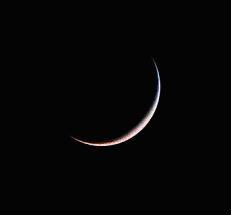Customarily, the Shabbat before Rosh Chodesh is called “Shabbat Mevarchim” because after the Torah reading the coming of the new month is announced and then a special prayer is said (Rema OC 284:7).
However, on this Shabbat no announcement is made, despite the fact that next Shabbat is Rosh Chodesh – the custom is that the month of Tishrei is not announced.
The Magen Avraham explains that this is based on the verse, “Blow the shofar at the new moon, at the covering for the day of our holiday.” (Tehillim 81:4) Unlike other holidays, which are either at the full moon (Pesach, Sukkot) or at least when the moon has begun to appear (Shavuot), the holiday on which we blow the shofar is at the beginning of the month when the moon is com- pletely or almost completely covered.
HIGH HOLIDAY OR HIDE HOLIDAY?
The Magen Avraham seems to understand that this verse hints that not only is the moon covered on this holiday, but the holiday itself is in a sense “covered” or hidden. We don’t make a fanfare about its approach.
There is another halakha with a similar message. In “Sefer Maharil” on the customs of Ashkenazi Jews, the Maharak notes: “It is a proper custom to blow the shofar from Rosh Chodesh Elul, in order to confuse the Accuser, so he does not know when to prosecute. Therefore, we don’t blow the shofar on Rosh HaShana eve, so that the Accuser will think that the day of judgment has passed.” (Maharil Minhagim, Days of Awe)
According to this explanation, the custom of blowing the shofar during Elul is expressly intended to create confusion (on the part of Satan) exactly when Rosh HaShana falls.
In fact, the entire Rosh HaShana holiday exhibits a pattern of seeming ambivalence. For instance, on Rosh HaShana we do wear clean clothes and groom ourselves for the holiday (OC 581:3); but we do not wear our best Yom Tov clothes (Taz). Similarly, “We eat and drink and rejoice, and do not fast on Rosh HaShana” (OC 597:1). Even so, the continuation of this same chapter explains that we shouldn’t eat to satiety, and that according to some traditions even fasting may be permissible.
All of these laws reflect the essential paradox of Rosh HaShana. On the one hand, the Day of Judgment is inherently a day of awe. Who is in the mood for festivities on the day of a court appear- ance even for a minor infraction?! Certainly on the day of our judgment before the King of Kings we should be in a state of awe. Yet HaShem made this day a holiday as well, “a covering for the day of our holiday”. The Tur (OC 581) explains that this shows our confidence that HaShem will judge us favorably. Certainly at the communal level we don’t want the day of judgment to seem like an ominous day, as we are confident that the merit of the community of Israel will result in a favorable judgment.
In order to show our confidence in the merit of the Jewish people, Rosh HaShana is marked as a festive day. But in order to experience the awe of judgment, and not to display arrogance as if we have nothing to fear from our heavenly trial, we take pains to obscure the day a bit and not to make it appear that we are too anxious for its arrival.
Rabbi Asher Meir is the author of the book Meaning in Mitzvot, distributed by Feldheim. The book provides insights into the inner meaning of our daily practices, following the order of the 221 chapters of the Kitzur Shulchan Arukh.
The words of this author reflect his/her own opinions and do not necessarily represent the official position of the Orthodox Union.

